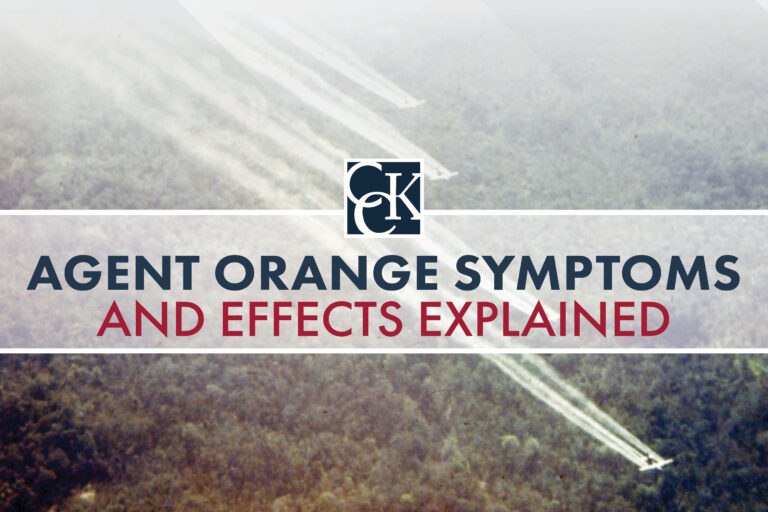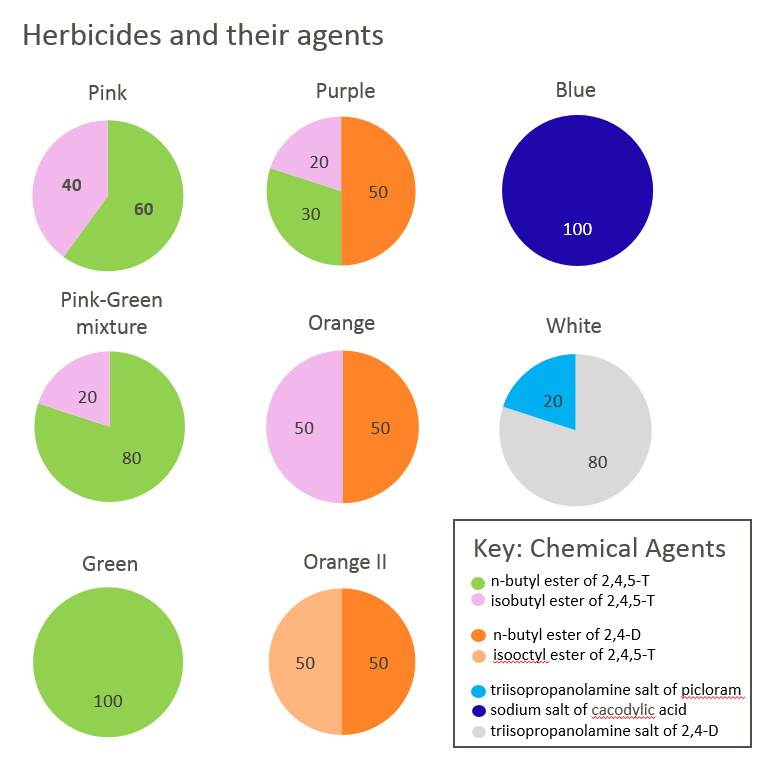Agent Orange Symptoms and Effects Explained

CCK Law: Our Vital Role in Veterans Law
Many medical conditions are associated with Agent Orange exposure. Diabetes, Parkinson’s disease, and several types of cancer are among the diseases caused by Agent Orange. If you were exposed to Agent Orange during military service, then you may qualify for VA disability benefits.
The U.S. Department of Veterans Affairs (VA) grants disability benefits to veterans who develop disabilities as a result of their military service. Typically, a veteran must prove service connection to qualify for benefits. However, VA presumes service connection if you were exposed to Agent Orange and later developed certain conditions.
Agent Orange and the Vietnam War
Agent Orange is one of the several “rainbow” herbicides used by the United States during the Vietnam War era. The United States military used Agent Orange and other herbicides to deforest large areas of land in Vietnam to disrupt enemy supply lines and prevent ambushes. Thus, many veterans who served during the Vietnam War era had direct exposure to herbicides, such as Agent Orange.
Agent Orange is a toxic herbicide composed of two kinds of herbicide agents, 2,4-Dichlorophenoxyacetic Acid (2,4-D) and 2,4,5-Trichlorophenoxyacetic Acid (2,4,5-T). The highly toxic dioxin contaminant known as 2,3,7,8-TCDD is a byproduct that Agent Orange produces. The effects of dioxin exposure can be serious.
This dioxin often takes years to break down once it has been released into the environment and can continue to cause a wide array of health effects. This made it even more likely for Agent Orange exposure in Vietnam to cause many serious health conditions for veterans.

Agent Orange Symptoms, Medical Conditions, and Side Effects
What Are the Side Effects of Agent Orange?
VA recognizes certain conditions and their symptoms as having a strong association with Agent Orange exposure. The following Agent Orange side effects are considered presumptive by VA:
- AL amyloidosis
- Bladder cancer
- Chronic B-cell leukemias
- Chloracne
- Diabetes mellitus type 2
- Hodgkin’s disease
- Hypertension
- Hypothyroidism
- Ischemic heart disease
- Monoclonal gammopathy of undetermined significance
- Multiple myeloma
- Non-Hodgkin’s lymphoma
- Parkinson’s disease
- Parkinson’s-like Symptoms
- Peripheral neuropathy
- Porphyria cutanea tarda
- Prostate cancer
- Respiratory cancer
- Soft tissue sarcomas
Agent Orange Effects and Presumptive Service Connection
The Agent Orange Act of 1991 established presumptive service connection for veterans who served during certain periods in specific locations and have been diagnosed with one of the above conditions. In addition, the Honoring Our Promise to Address Comprehensive Toxics Act (PACT Act) of 2021 expanded presumptions related to Agent Orange exposure to include additional locations and periods.
Presumption of exposure means that veterans who served in these locations at certain times do not have to provide the typical elements to establish service connection. Unlike other claimants, they do not need to show evidence of an in-service event or injury leading to their condition.
Do You Qualify for the Agent Orange Exposure Presumption?
Note: the information below is subject to change, as VA has expanded eligibility for presumptions over time.

If a veteran served on active duty in any of the locations below, VA automatically presumes that the veteran had exposure to Agent Orange.
Vietnam
- On land, on a vessel operating on the inland waterways, or on a vessel operating not more than 12 nautical miles seaward from the demarcation line of the waters of Vietnam and Cambodia as defined in Public Law 116-23 (Blue Water Navy Vietnam Veterans Act 2019) between January 9, 1962 and May 7, 1975
C-123 Airplanes
- Possible exposure of C-123 flight, ground maintenance, and aeromedical crew members to herbicide residue in C-123 planes flown during and after the Vietnam War
Korean Demilitarized Zone
- Along the demilitarized zone in Korea between Sept. 1, 1967, and August 31, 1971.
Thailand Military Bases
- On any U.S. or Royal Thai military base in Thailand from January 9, 1962, through June 30, 1976.
Herbicide Tests and Storage in the U.S.
- At military locations in 12 states—Alabama, Arkansas, Florida, Georgia, Indiana, Maryland, Mississippi, Montana, New York, Tennessee, Texas, and Utah—where Agent Orange was present in the 1940s, 1950s, 1960s, and 1970s.
- A full list of the specific states and times is available on the VA website.
How to Prove Agent Orange Exposure
To receive VA disability benefits for Agent Orange symptoms and conditions, you must include the following evidence as part of your claim:
- A medical diagnosis of any of the presumptive conditions; and
- Evidence that you served in a qualifying location during the timeframes listed above.
If your medical condition does not appear on the list of presumptive conditions, you may still be able to receive VA disability benefits due to Agent Orange exposure. However, you will need additional evidence to support your case:
- A current diagnosis of your medical condition; and
- A link, or “nexus”, between Agent Orange and your disability. This usually requires an opinion from a medical professional.
Even if your doctor states that your current condition is due to Agent Orange exposure, VA may still deny your claim. If this happens, the team of veterans (VA) lawyers at Chisholm Chisholm & Kilpatrick LTD may be able to help with your appeal.

Agent Orange Registry Health Exam
Veterans who served during the Vietnam War era may also be eligible for an Agent Orange Registry Health Exam. This exam is free of charge. The purpose is to “alert Veterans to possible long-term health problems that may be related to Agent Orange exposure during their military service.”
This exam is not a Compensation & Pension (C&P) exam and is not required to receive VA benefits. The Agent Orange Registry Health Exam is based on the veteran’s recollection of service, not their military service records. VA notes that these exams can help them better understand and respond to the effects of Agent Orange.
Through the program, veterans may receive free lab tests and referrals to medical specialists for their Agent Orange-related symptoms.
Agent Orange Effects on Dependents
The effects of Agent Orange exposure may not end with the veteran; they may also contribute to birth defects and disorders in veterans’ children. Studies have indicated that Agent Orange exposure has led to increased rates of stillbirths and birth defects in the children of veterans exposed to Agent Orange.
Additionally, evidence has linked Agent Orange exposure to spina bifida, a birth defect in which the spinal cord does not develop properly. Other neural conditions and nervous disorders in veterans’ children may also be Agent-Orange-related.
VA Disability Compensation Rates for Agent Orange-Related Conditions
If you are granted service connection for a medical condition due to Agent Orange exposure, then your monthly compensation amounts will depend on your VA disability rating. VA disability ratings are assigned based on the severity of your condition.
As of 2026, the VA disability rate benefit amounts are as follows:
- 0 percent disability rating: $0.00 per month
- 10 percent disability rating: $180.42 per month
- 20 percent disability rating: $356.66 per month
- 30 percent disability rating: $552.47 per month
- 40 percent disability rating: $795.84 per month
- 50 percent disability rating: $1,132.90 per month
- 60 percent disability rating: $1,435.02 per month
- 70 percent disability rating: $1,808.45 per month
- 80 percent disability rating: $2,102.15 per month
- 90 percent disability rating: $2,362.30 per month
- 100 percent disability rating: $3,938.58 per month
Call CCK For a Free Case Evaluation
Chisholm Chisholm & Kilpatrick LTD is the largest veterans law firm in the country, with over 300 years of combined experience. Our team of lawyers and advocates at CCK may be able to help you with your VA disability claim or appeal. For a free case evaluation with a member of our staff, call us at 401-237-6412 or contact us via email or web form.
Share this Post